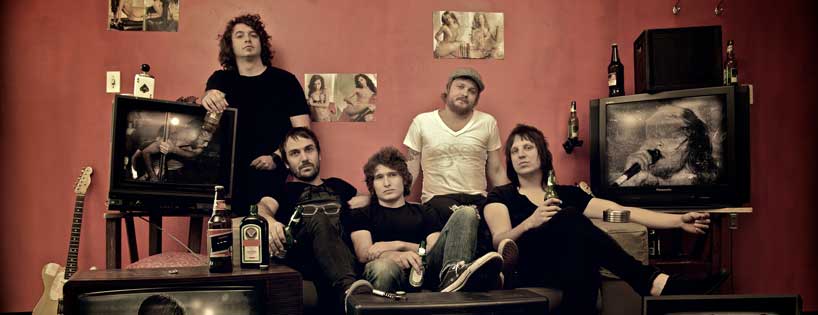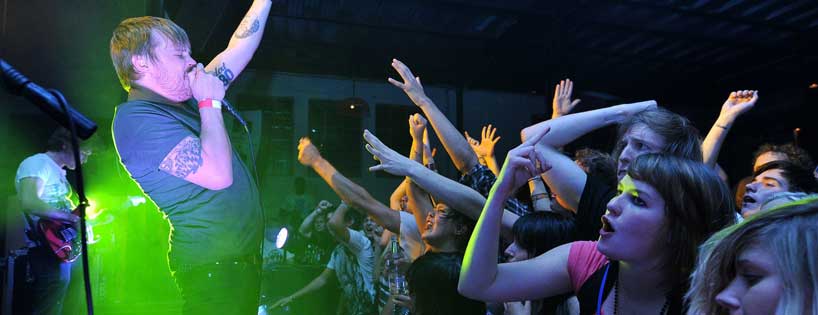BY NATHAN CRANFORD
The Western world has seen the rise (and fall) of numerous upstarts in various artistic fields. One could say that the rise of Dadaism in Europe, as exemplified by that most fabulous Fountain of Marcel Duchamp, did much to open up the possibilities of expression in visual art. So too did those illuminations of the deepest, darkest recesses of the human psyche found in many of the films directed by Italian auteur Pier Paolo Pasolini. Nearly half a century after their creation, these achievements in artistic expression continue to haunt and bewilder both art students and connoisseurs alike, despite never having achieved mass appeal for the public-at-large. Yet, with music, effecting change to the expressive limitations of the artform hasn’t always been so dramatic–and many of the controversies it introduced were quickly absorbed and formalized within the medium with little to no public fanfare over time.

Left to Right: Hunter Kennedy, Wynand Myburgh, Johnny de Ridder, Francois Van Coke, Jaco Venter. Photo by 187.
As time marched forward into the 21st Century, many felt that there was nothing that music could do to effect change, or at the very least, cause a stir–that is, until the South African punk band Fokofpolisiekar (Fuckoffpolicecar) burst out onto the country’s burgeoning youth scene in 2003.
(A “Brand New Afrika” it ain’t; the song title in English is “Burn South Africa.”)
To many of us who happened to live through the punk revolutions of the 1970s and ’80s, and more recently, the dreaded, but short-lived controversy surrounding explicit lyrics in popular forms of music during the 1990s, a name like “Fuckoffpolicecar” seems relatively tame in comparison. Not so, however, to the many religious and social conservatives that strove to maintain their grasp on South African society following the fall of Apartheid in the mid-1990s. Many, particularly in South Africa’s Christian community, were extremely offended by the band’s criticisms of religion and conservative social values–not to mention by how the naughty word “Fokof” is figured so prominently in the band’s name. However, unlike the “blasphemies” so inherent to the art of Duchamp and the films of Pasolini, Fokofpolisiekar’s work achieved one critical component of social disturbance both European artists failed to achieve during their lifetime: mass popularity.
Noticeably influenced by the internationally famous punk/alternative rock act Queens of the Stone Age, Fokofpolisiekar managed to take a style of music oft heard and appreciated in silence by marginalized South African youths, and propel it into the national limelight virtually overnight. Suddenly, the country’s predominantly Afrikaans-speaking youth culture had a voice of their own that crooned in a way that was not only true to the “tenets” of punk and alternative rock, but turned out to be extremely good music to boot.
Despite the band’s unyielding quest for progress in expanding the boundaries of South Africa’s iron house of religious morality, Fokofpolisiekar met its match in 2006 when one of the band members “inadvertently” wrote the words “fok god” (“fuck god”) on a fan’s wallet (one recalls John Lennon’s similar gaffe in the United States almost half a century earlier)–inciting the country’s religious leaders to pull out all the stops in order to put an end to the band’s godless influence. With the entirety of the South African media suddenly turned against the band, Fokofpolisiekar was literally forced to lie prostrate and apologize to an apparently incensed public–and even more brutally to their image, to intone that the public’s inevitable forgiveness is something that “Jesus would have done.” Surely a triumph for free speech in South Africa, indeed.
Amazingly enough, however, and perhaps owing to the growing numbers of those who could care less about their country’s socially conservative and religious initiatives, Fokofpolisiekar’s popularity, commercial and otherwise, never truly suffered as a result of their public humiliation–in fact, one could say that the band’s influence within South Africa and beyond only got stronger as a result. In fact, an entire documentary has been made on the band’s trials and tribulations over the last decade to further the cause of free artistic expression in South Africa. Watch the trailer below.
RELATED LINKS
Fokofpolisiekar Official Website
If you want to pretend for a minute that you know more than we do about music, go ahead, send us your thoughts. Hit us with your best shot, we dare you.
Follow us on Twitter and like us on Facebook to give us a shout. You can also stay on top of exciting events from around the world by downloading the eventseeker app for iPhone, Android or Windows.


